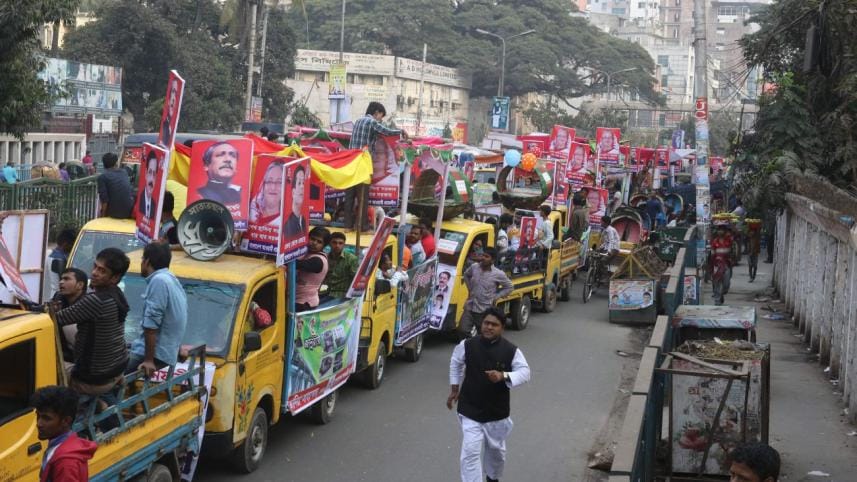Conditional rally,conditional politics and more

It is a great relief that 5th January passed off without any untoward incident, although the stipulations set by the DMP before giving the go-ahead were observed only in their violation. This time the DMP was magnanimous enough to levy only six conditions to the requests of the political parties to hold rally to observe 5th of January. One recalls that in March 2012 the BNP had to commit adherence and fulfillment of eleven conditions (apart from the 19 directives of the DMP) before they were allowed to hold a meeting in Dhaka city. That was conditional politics which we commented upon in this column, and apparently things haven't changed, for politics or democracy; those remain conditional still.
However, nobody got the Udyan, thanks to the DMP's 'evenhanded' tackling of the issue, which had no other alternative but to turn down both the requests. But shouldn't the first applicant, whoever that was, have a better claim on the use of the spot? One wonders who was the first to seek permission for the use of Suhrawardy Udyan!
When a political programme is subjected to restrictive proviso, admittedly for the sake of law and order and public safety, it does not say much about politics or our polity and even less about democracy. That a security agency of the government should remain the sole authority to determine where, when and how a political party should organise its programme is indicative of the deep malaise in our system.
It is no fault of the DMP that it had laid down conditions for public meetings this time and in the past; it is in the DMP's terms of reference which it has meticulously followed. The injudiciousness is on the part of those that thought it fit to entrust a law enforcing agency to be the sole judge in the matter of politics. In many countries public meetings are subject to approval of the administrative authorities where advice of the law enforcing agencies is a determinant, but the final decision is that of the civil administration and not of the police. However, such an arrangement is sometimes of a help to the party in power, unwilling to provide any political space to the opponent at any cost, to absolve itself of any responsibility in case an opposition's request is turned down, and as we have heard many times in the past and this time too, it 'is all up to the police, and the government has nothing to do with it."
5th January has appeared twice since the 2014 general elections, when democracy assumed a different character. It is a day with great historical significance, but what is regrettable is the violence it engendered last year when the safety and security of the people were subordinated to the interest of political parties. Neither the interest of the people nor the cause of democracy in Bangladesh was served. The ominous anticipation of the public was reflected in the unusually thin traffic on 5th January this year.
But 5th January is more about holding peaceful rallies. It is more about castigating the political opponent. It is more about one party's effort to come to power at all costs and another's attempt to perpetuate power by all means. Beyond those efforts, that have become a routine predisposition of the political parties in our country, there is need to reset the garbled democracy that we have at this moment. And surely a party like the AL, whose prime motive force has been to serve the cause of democracy, cannot feel happy or comfortable with the current political dispensation – the makeup of the parliament and the government.
We are happy to note that the tone and tenor of the BNP leader suggest an acknowledgement of the fact that political programmes without people's participation are counterproductive, and whenever there is spontaneous participation of the people violence no longer becomes an option. It would have been nice though to hear from BNP chief some expression of remorse for people like Selina Begum (who was in the headlines in this paper yesterday) who lost her 19 year old bus-helper son to the arsonists' fire last year, and many like her who are still carrying the scars of last year's violence.
As for the AL, it has called for moving on towards peaceful politics but it must come out of its mindset of denying space to the BNP, particularly in Dhaka city. And the urge to use the law enforcing agency to deny the BNP the political space it needs to function as a political party, should not be given in to. It is time the positivity that exuded from the language of the two parities on Tuesday at the rallies is given a fillip through substantive actions from both camps.
The writer is Associate Editor, The Daily Star.




 For all latest news, follow The Daily Star's Google News channel.
For all latest news, follow The Daily Star's Google News channel.
Comments